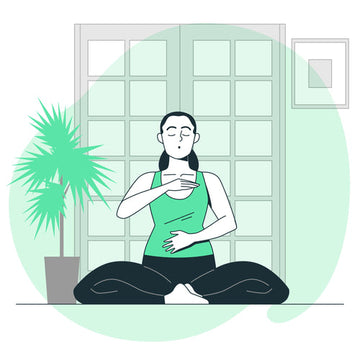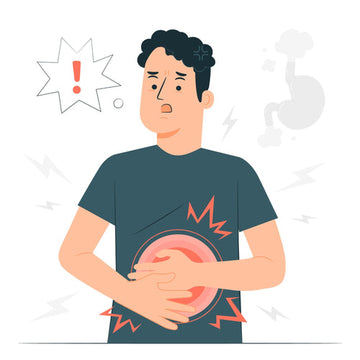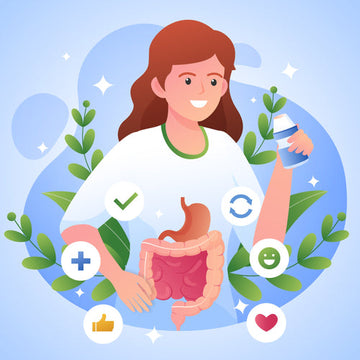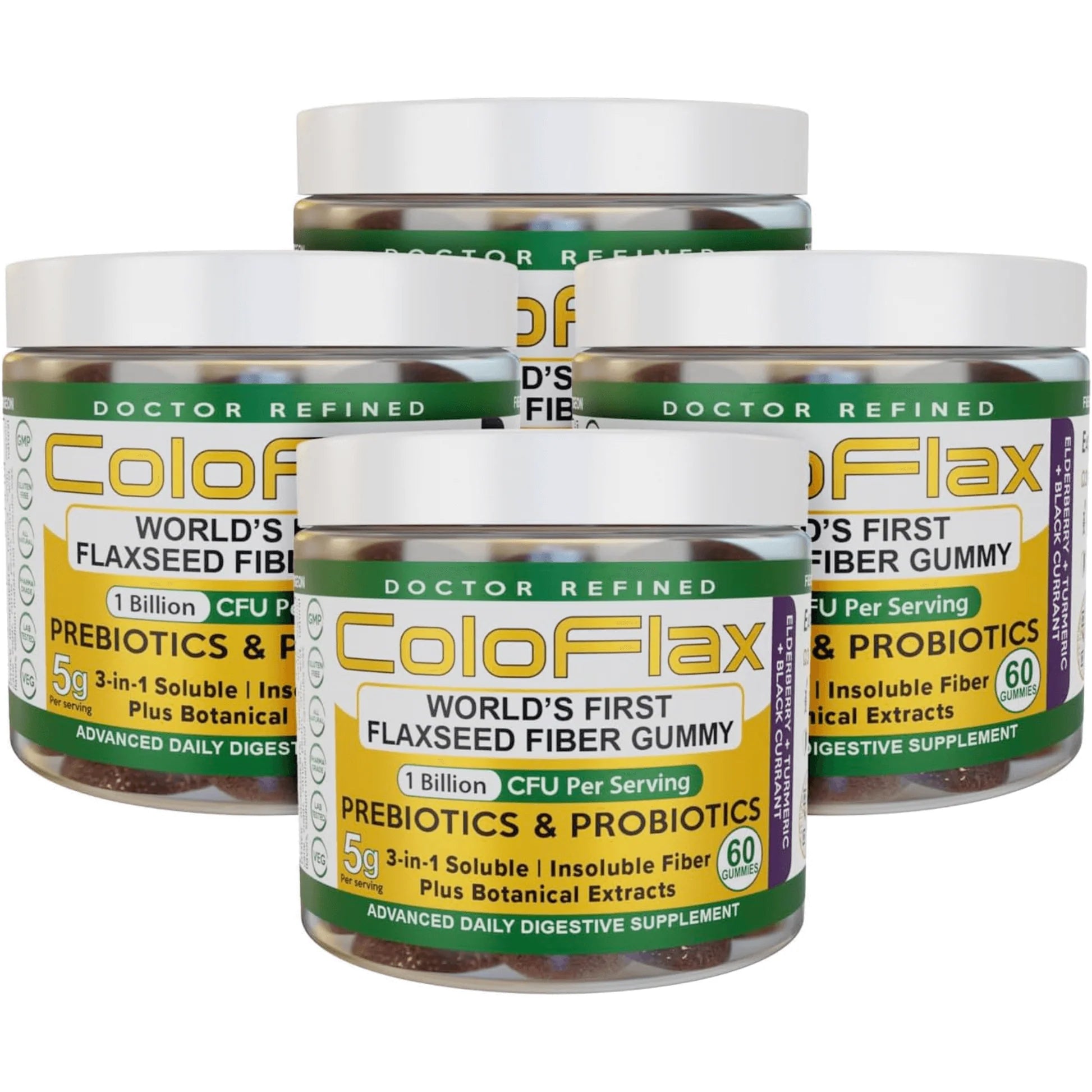What’s the first thing that comes to mind when you think of a weight-loss diet?
Maybe it’s the keto approach, whereby you starve yourself of carbs to force your body into a state of ketosis, thus burning fat for fuel. Maybe you prefer the “no-fat” approach or have been convinced that drinking a vile concoction every day will somehow melt pounds from your waistline.
But weight loss doesn’t need to be rapid or extreme. It doesn’t need to be a “secret” that you learn from an influencer or acquire via a $100-a-month subscription.
One of the simplest ways to lose weight is to eat more fiber.
It’s a scientifically proven way to shed pounds, and unlike many crash diets and extreme supplement regimes, it won’t leave you with endless cravings.
Can Fiber Help with Weight Loss?
In 2019, a large-scale study looked at the effects of high-fiber intake on overweight and obese men and women consuming calorie-restricted diets.(1) Baseline parameters were measured at the start of the study and then checked again 6 months later.
Researchers found that fiber intake had the greatest impact on weight loss results. This was true even when all other factors had been considered.
The study concluded that “Dietary fiber intake, independently of macronutrient and calorie intake, promotes weight loss and dietary adherence”.
In other words, regardless of carb/protein/fat and even calorie consumption, those who ate more fiber lost more weight and were more likely to adhere to their diet.
This is just one study. There have been many more.
But if fiber is so effective and a natural part of our diet, why aren’t we all at our ideal weight and why do we struggle to stick to our diets?
It’s because fiber is pretty scarce in the American diet. It has been estimated that as many as 95% of Americans don’t eat the recommended amount of fiber, which is around 25g per day.(2)
Processed food is very low in fiber, and you won’t find much fiber in meat or dairy, either. You need beans, legumes, vegetables, whole grains, and fruits, all of the things that are seriously lacking in the average American’s diet.
Why Does Fiber Help with Weight Loss
We’ve established that a high-fiber diet can help you to lose weight, especially if you’re overweight or obese.
But fiber isn’t digested by your body in the same way as fats, carbs, and protein. It doesn’t contain some magical compound that melts away bodyfat or revs up your metabolism.
So, why is it so effective?
There are a few reasons:
It Keeps You Fuller for Longer
Fiber fills you up, and it does so with minimal calorie cost.(3)
Satiety is largely down to the fullness of your stomach, as opposed to how many calories you have consumed. If you eat larger and more fiber-filled meals over the course of the day, they will fill you up and may prevent all those snack cravings that are crippling your diet.
It’s not just about filling your stomach, though. If that were the case then water would have the same effect. What makes fiber so effective is that it slows down digestion by forming a plug.
Take psyllium as an example. It’s a fiber supplement, but it’s also a form of soluble fiber that most people are familiar with, so it serves as the perfect example.
When you mix psyllium with water, it forms a gel-like substance. If you leave it for a few minutes, it’ll acquire a gummy texture. This is essentially what’s happening in your digestive system, which means that it moves very slowly and prolongs the feeling of fullness you get from food.
You don’t need to take psyllium to get these effects. Consuming high-fiber meals will do the same thing.
You May Eat Less Junk Food
Think back to the last time you were constipated. You were probably sluggish, tired, and maybe even a little irritable.
Now think about what you ate.
Did you make yourself a big bowl of bran cereal to help things move along? Did you spend the day eating salads, fruits, vegetables, and big bowls of beans and peas?
Or did you just take a few laxatives, eat fast food, and wait for everything to pass?
Probably the latter.
When we’re constipated, we usually don’t feel like eating fibrous foods. We want something energy dense, as that means we can get the calories we need without adding more volume to an already-strained digestive system.
But of course, those foods just make the problem worse.
If you’re getting your fill of fiber, you’ll be less likely to suffer from constipation, which means you’ll have fewer of those days when your diet goes out the window because you’re just not feeling it.
It Will Improve Your Digestion
You can never underestimate the benefits of a healthy digestive tract. You need fiber to keep everything moving down there, but you also need it to feed your healthy gut bacteria.
There are trillions of bacteria living in your gut, and if these aren’t in balance, you may experience all kinds of digestive issues.
These issues could affect everything from your energy levels to your immune function. They might not cause you to gain weight directly, but they could affect the things that lead to weight gain, including sleep deprivation, fatigue, and low energy levels.
What are the Best High-Fiber Foods and Supplements for Weight Loss?
All fiber is great if you’re trying to lose weight, and you should endeavor to eat at least 25 grams of it every day. But if weight loss is your goal, some types of fiber may be more beneficial than others.
Here are a few fiber types and supplements to look into.
Konjac Flour (Glucomannan)
Glucomannan is a type of fiber extracted from konjac root. It absorbs water in the gut and forms a plug that can help with satiety and constipation. It has also been used to make rice, pasta, and noodle alternatives that are incredibly low in calories.
If your diet is high in noodles and pasta and you can’t turn your back on these foods, look into products made with konjac flour. Don’t think of them purely as a low-calorie alternative, though. They are also a great way to fill you up and prevent cravings for sweet and fatty foods.
Psyllium
Psyllium is often advertised as a bulk-forming laxative. It’s a soluble fiber that gels, clumps, and then pushes everything out. It’s very effective but needs to be treated with respect.
Psyllium is usually safe, but that doesn’t mean you can take it, forget about it, and then go about your day. If your constipation is caused by dehydration, psyllium could make your situation much worse.
So, keep the dose low, drink plenty of water, and you can get all the benefits without any of the side effects.
ColoFlax
ColoFlax is a complete fiber supplement in gummy form. It’s more convenient than sachets of psyllium, tastier than glucomannan, and in addition to a high-fiber content, it is also a great source of omega-3 fatty acids, prebiotics, probiotics, and botanical extracts that support your digestive health.
Check out the ColoFlax product page for more information.
Beans
Lima beans, black beans, and other types of beans are packed with soluble fiber, which works in the same way as psyllium husk. The difference is that you’ll also be getting lots of protein, minerals, and vitamins, making these foods ideal if you need more fiber in your diet.
A single cup of beans can contain anywhere from 10g to 15g of fiber on average. This is roughly what the average American consumes in an entire day. If you eat those beans with a serving of vegetables and a slice of seeded bread, followed by a couple of servings of fruit later in the day, you’ll meet your fiber goals.
Is Fiber All That I Need to Lose Weight?
Obviously, fiber isn’t the only thing you need to lose weight. It’s just one piece of the puzzle. It’s a very important piece, but there are other considerations:
Record What You Eat
Numerous studies have found that humans are very bad when it comes to monitoring food intake. There are plenty of apps and websites out there that offer this service, and millions of Americans use them, but they don’t get used properly.
For instance, you might record the salad, burger, and fries that you eat, only to forget about the dressing that went on the salad or the sauce you drizzled on the fries. You might record a full day of eating, but neglect to include the bag of chips you ate at work or the candy you ate after lunch.
These apps can help, but only if you use them properly. So, record everything that you eat and drink, with no exceptions.
Eat a Balanced Diet
You need a balance of complex carbs, protein, and healthy fats.
Protein is especially key, as your body doesn’t process calories in the same way. Something known as the thermic effect of food means your body burns more of the protein/carb calories you consume (when compared to fat).(4)
For instance, 2,000 calories of fat will lead to more rapid weight gain than 2,000 calories of protein.
It’s also important to keep salt and sugar to a minimum, cut back on your alcohol intake, and avoid any situations that may increase cravings.
Exercise
Every little helps when it comes to exercise.
You don’t need to pay for a monthly gym membership that you’ll probably never use. You definitely don’t need to go from a sedentary lifestyle to jogging at 5 AM every day.
Take it slowly, as that way you’ll be less likely to give up when it gets too hard and your body revolts.
If you spend all your time sitting down, start taking more walks or doing a little yoga.
Remember the Basics
The reason that fiber is so effective for weight loss is that it reduces your cravings and means you consume fewer calories over the day. It’s not rocket science—weight loss is mostly down to calories in vs calories out.
If you eat less, you can tip the balance in your favor. If that’s too difficult, then earn those calories by exercising. Ideally, you should be doing both of these things.
Weight loss doesn’t need to be about starving yourself from now until eternity. It doesn’t mean that you need to eat like a rabbit and hit the gym every day. As long as you’re burning more calories than you’re consuming, you will lose weight, and that’s all that matters.
It also means that it’s okay to have a cheat day on a Friday or Saturday, as long as it’s just one day a week.






